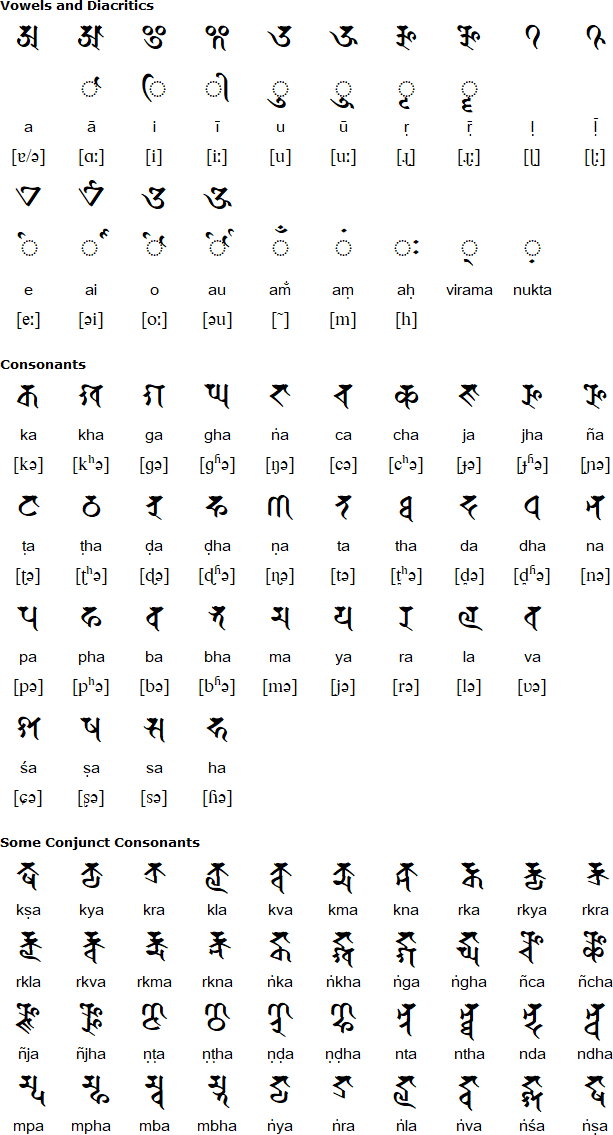The Siddham script is a descendent of the Brahmi script and an ancestor of the Devanagari script. The name Siddham comes from Sanskrit and means "accomplished or perfected". The Siddham script is mainly used by Shingon Buddhists in Japan to write out mantra and sutras in Sanskrit. It was introduced to Japan by Kukai in 806 AD after he had studied Sanskrit and Mantrayana Buddhism in China. In Japan the Siddham script is known as 梵字 (bonji).

See how to write the Siddham letters:

Sarvē mānavāḥ svatantrāḥ samutpannāḥ vartantē api ca, gauravadr̥śā adhikāradr̥śā ca samānāḥ ēva vartantē. Ētē sarvē cētanā-tarka-śaktibhyāṁ susampannāḥ santi. Api ca, sarvē´pi bandhutva-bhāvanayā parasparaṁ vyavaharantu.
Source: http://www.visiblemantra.org/human-rights.html
All human beings are born free and equal in dignity and rights. They are endowed with reason and conscience and should act towards one another in a spirit of brotherhood.
(Article 1 of the Universal Declaration of Human Rights)
Information about the Siddham script
http://en.wikipedia.org/wiki/Siddhaṃ_alphabet
https://ja.wikipedia.org/wiki/梵字
http://www.visiblemantra.org/siddham.html
https://www.endangeredalphabets.net/alphabets/siddham/
https://www.sanskritabhyas.in/en/Siddham/List
http://www1.plala.or.jp/eiji/BONJI.htm
Siddham fonts
http://tongphuockhai.wordpress.com/
2011/01/29/software-siddham-lantsa/
Bhaiksuki, Brāhmi, Devanāgari, Galik, Grantha, Gupta, Kadamba, Kharosthi, Nandinagari, Sharda, Siddham, Thai, Tibetan
Ahom, Aima, Arleng, Badagu, Badlit, Basahan, Balinese, Balti-A, Balti-B, Batak, Baybayin, Bengali, Bhaiksuki, Bhujimol, Bilang-bilang, Bima, Blackfoot, Brahmi, Buhid, Burmese, Carrier, Chakma, Cham, Cree, Dehong Dai, Devanagari, Dham Lipi, Dhankari / Sirmauri, Ditema, Dives Akuru, Dogra, Ethiopic, Evēla Akuru, Fox, Fraser, Gond, Goykanadi, Grantha, Gujarati, Gunjala Gondi, Gupta, Gurmukhi, Halbi Lipi, Hanifi, Hanuno'o, Hočąk, Ibalnan, Incung, Inuktitut, Jaunsari Takri, Javanese, Kaithi, Kadamba, Kamarupi, Kannada, Kawi, Kharosthi, Khema, Khe Prih, Khmer, Khojki, Khom Thai, Khudabadi, Kirat Rai, Kōchi, Kodava Lipi, Komering, Kulitan, Kurukh Banna, Lai Tay (Tai Yo), Lampung, Lanna, Lao, Leke, Lepcha, Limbu, Lontara/Makasar, Lota Ende, Magar Akkha, Mahajani, Malayalam, Meitei (Modern), Manpuri (Old), Marchen, Meetei Yelhou Mayek, Meroïtic, Masarm Gondi, Modi, Mon, Mongolian Horizontal Square Script, Multani, Nandinagari, Newa, New Tai Lue, Ojibwe, Odia, Ogan, Pahawh Hmong, Pallava, Phags-pa, Purva Licchavi, Qiang / Rma, Ranjana, Rejang (Kaganga), Sasak, Savara, Satera Jontal, Shan, Sharda, Sheek Bakrii Saphaloo, Siddham, Sinhala, Sorang Sompeng, Sourashtra, Soyombo, Sukhothai, Sundanese, Syloti Nagri, Tagbanwa, Tai Noi, Takri, Tamil, Tanchangya (Ka-Pat), Tani, Thaana, Telugu, Thai, Thirke, Tibetan, Tigalari, Tikamuli, Tocharian, Tolong Siki, Vatteluttu, Warang Citi
Page last modified: 13.04.23
[top]
You can support this site by Buying Me A Coffee, and if you like what you see on this page, you can use the buttons below to share it with people you know.

If you like this site and find it useful, you can support it by making a donation via PayPal or Patreon, or by contributing in other ways. Omniglot is how I make my living.
Note: all links on this site to Amazon.com, Amazon.co.uk
and Amazon.fr
are affiliate links. This means I earn a commission if you click on any of them and buy something. So by clicking on these links you can help to support this site.
[top]